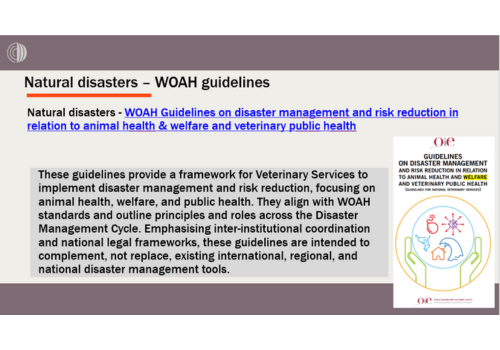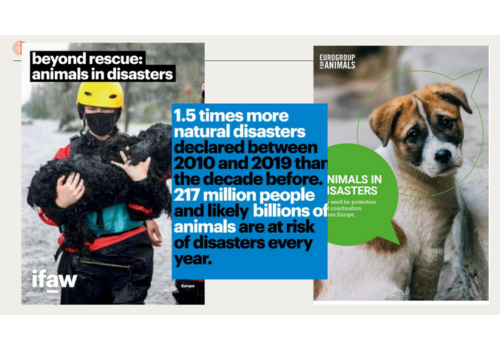Given Japan’s susceptibility to numerous natural disasters, the “One Welfare” concept underscores the importance of addressing both human and animal needs during evacuation and handling. Although the welfare of pets and their owners has increasingly been considered by policymakers in Japan, the welfare of livestock in disaster situations has not received significant attention.
WOAH was invited to speak at a hybrid symposium organised by the Japanese Association of Animal Welfare Science on 6 April 2025 at the Nippon Veterinary and Live Science University, Tokyo, Japan.
The symposium focused on “Livestock and natural disaster response” (産業動物と災害時対応).
Speakers included:
Dr Aki Tanaka, Faculty of Veterinary Science, Nippon Veterinary and Life Science University
“Introduction to disaster response”
Mr Hikaru Nakano, Ministry of Agriculture, Forestry and Fisheries (MAFF), Japan
“Japan’s response during disasters”
A slide from Dr Kugita's presentation on WOAH guidelines for natural disasters and animals.
Dr Hirofumi Kugita, WOAH Regional Representative for Asia and the Pacific
“The role of WOAH and disaster response in the context of WOAH animal welfare standards”
A slide from Dr Dalla Villa's presentation showing facts on animal welfare and natural disasters.
Dr Paolo Dalla Villa, WOAH Standards Department
to be aligned with the need to coordinate crisis management efforts and mitigate the impact of disasters with a One Health perspective.
Also shown was a video report, “Philippines: the impact of emergencies on animal health”, developed by WOAH to show the impact that extreme emergency events can have on animal health. The video report shows a powerful example – a volcanic eruption – of how emergencies can have severe cascading effects on our interdependent ecosystems, affecting animal and human health, food systems, livelihoods and economies.
Watch the video: Available with Japanese or English (also see below) subtitles
Philippines: the impact of emergencies on animal health
A panel discussion included the following topics:
Animal welfare (regional site)
WOAH Guidelines on Animal Welfare in Disaster Risk Reduction
WOAH Guidelines on Simulation Exercises
WOAH Global Conference on Emergency Management in 2023 to convene the animal health community and other sectors to discuss emergencies impacting or involving animal health: Global Conference on Emergency Management WOAH
WOAH Regional Animal Welfare Strategy (RAWS) Asia-Pacific: WOAH RAWS Asia-Pacific
WOAH Platform on Animal Welfare for Europe (2024 – 2026): Welfare of animals in disasters
Animal Disaster Education (ADE) foundation page (ADE-Foundation)
Links to relevant publications available online:




